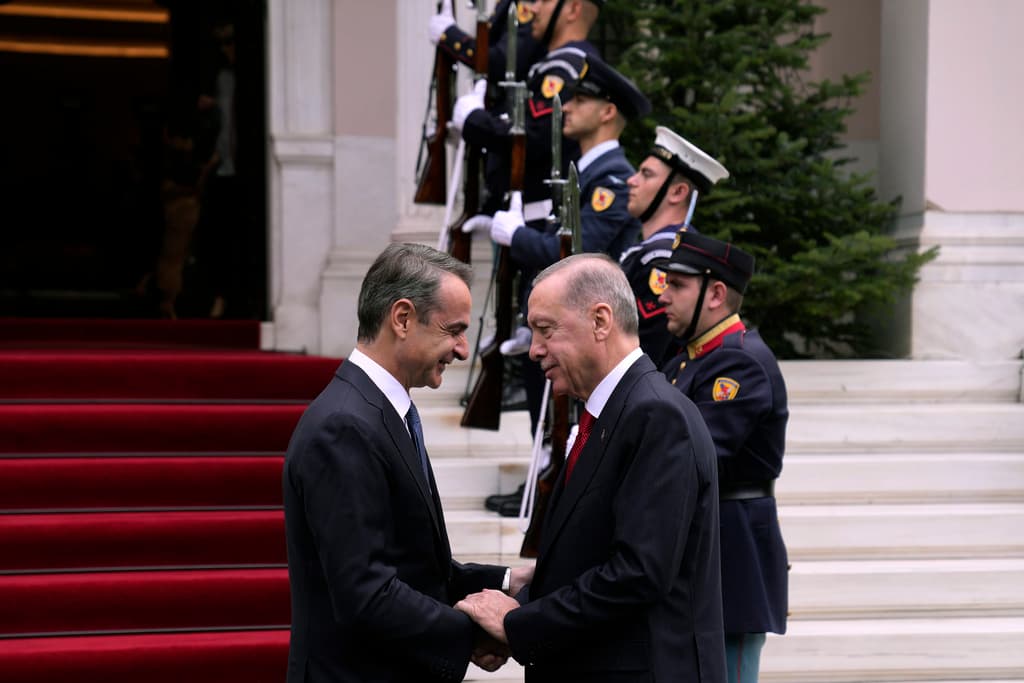A Kinder, Gentler Erdogan? Probably Not, Yet Athens Rolls Out Red Carpet Anyway For Top Turk on Flash Visit
President Ergogan visits Greek capital for the first time in six years, in a bid to smooth over frequently fractious relations between fellow NATO members Turkey and Greece.

ATHENS — For most Greeks, a visit from Vladimir Putin would be less consequential. President Erdogan, who recently said he seeks a “new chapter” in Turkey’s often testy relations with its neighbor, landed at Athens’ international airport on Thursday morning where an official half-day visit began. The Greek foreign minister, Giorgos Gerapetritis, greeted him before a motorcade took Mr. Erdogan to the center of Athens, where he met with the Greek president, Katerina Sakellaropoulou.
That short meeting was to be followed by a meeting with the prime minister, Kyriakos Mitsotakis. Security in the Greek capital has been extraordinarily tight, with military helicopters buzzing over Syntagma Square, snipers assigned to various locations, and normally snarled morning Athenian traffic mostly ground to a halt. The hope is that the carefully choreographed visit of Turkey’s often polarizing president, scheduled to last little more than five hours, will proceed without a hitch.
There is much at stake. Turkey and Greece, though both members of the North Atlantic Treaty, are frequently at odds over a number of issues, from migration and maritime boundary disputes to the thorny Cyprus problem.
“Being aware of the fact that there are issues on which we have differences, it is important to maintain a constructive climate,” Ms. Sakellaropoulou told Mr. Erdogan, adding, “your presence in Greece after six years I believe reflects this positive spirit.”
The Turkish leader was last in Athens in 2017, when he met Mr. Mitsotakis’ leftist predecessor Alexis Tsipras.
Mr. Erdogan, for his part, replied to Ms. Sakellaropoulou, “I believe that this summit will be the beginning of a new era in Greece-Turkey relations. I believe that it will be better for the future of both parties to talk seeing the glass as half full.”
In an interview with Greek newspaper Kathimerini a day before his flash visit on Thursday, Mr. Erdogan said he was seeking a “new chapter” in relations on the basis of “win-win” principles.
While the war in Ukraine and deterring Russian aggression takes center stage in the foreign policy agendas of many northern European capitals, in Mediterranean countries like Italy and Greece the migrant crisis looms particularly large. Ankara has served as a migration bulwark since a 2016 deal with the European Union, which Mr. Mitsotakis and other EU leaders want to update.
A retinue of diplomats accompanying the Turkish president will also be broaching with their Greek counterparts the longstanding issue of Greek-Turkish territorial disputes in the Aegean Sea. Mr. Erdogan has questioned century-old treaties that set out Aegean sovereignty, and Turkish and Greek warplanes regularly engage in mock dogfights in disputed airspace.
He has even issued veiled threats that Turkish forces “may come suddenly at night” to certain islands that he has accused Greece of “occupying” — raising hackles at both Athens and Washington.
Also not forgotten are incidents in 2020 in which Mr. Erdogan was seen, at least by Greeks, as having encouraged thousands of migrants to attempt to cross the northern frontier into Greece, causing days of clashes with border guards. The move was widely seen as a cynical Turkish attempt to draw the EU’s attention to the millions of asylum seekers in Turkey.
Energy resources in the Mediterranean are another point of contention. The discovery of hydrocarbon resources in the eastern Mediterranean has complicated ties and Ankara angered Athens in 2019 by signing a controversial maritime zone deal with Libya.
Following that Mr. Mitsotakis announced a military buildup in naval and air force equipment and signed new defensive agreements with America and France.
Yet relations have improved since February, when Greece sent rescuers and aid to Turkey after a massive earthquake killed at least 50,000 people.
Speaking to Kathimerini a day ahead of his visit, the Turkish president said that communication channels with Greece had been “revived” and that he looked forward to signing a declaration of bilateral friendship with Greece on Thursday. “Kyriakos my friend, we do not threaten you if you do not threaten us,” Mr. Erdogan said.
Mr. Mitsotakis, the conservative prime minister who won a second four-year term in June, has also shown readiness to reduce tension with Ankara. While no one expects long standing territorial disputes in the Aegean — or for that matter in Cyprus — to disappear overnight, a meeting of the bilateral high cooperation council which last convened in 2016 is being hailed by Athens as a positive step in rapprochement between the two countries.
And because the two countries are Greece and Turkey, with a long shared history full of twists and turns, people on both sides of the Aegean can expect a splash of intrigue, too. The Greek migration minister, Dimitris Kairidis, said earlier this week that the two countries’ coastguards have in recent months been cooperating smoothly on migration. Mr. Kairidis also evoked the possibility of a deal with Ankara to station a Turkish officer on the Greek island of Lesbos and a Greek officer at the western Turkish port of Izmir. Lesbos, only separated from Turkey by the narrow Mytilini Strait, is a refugee hotspot. For Greeks, of course, the Turkish port city of Izmir will always be Smyrna.

